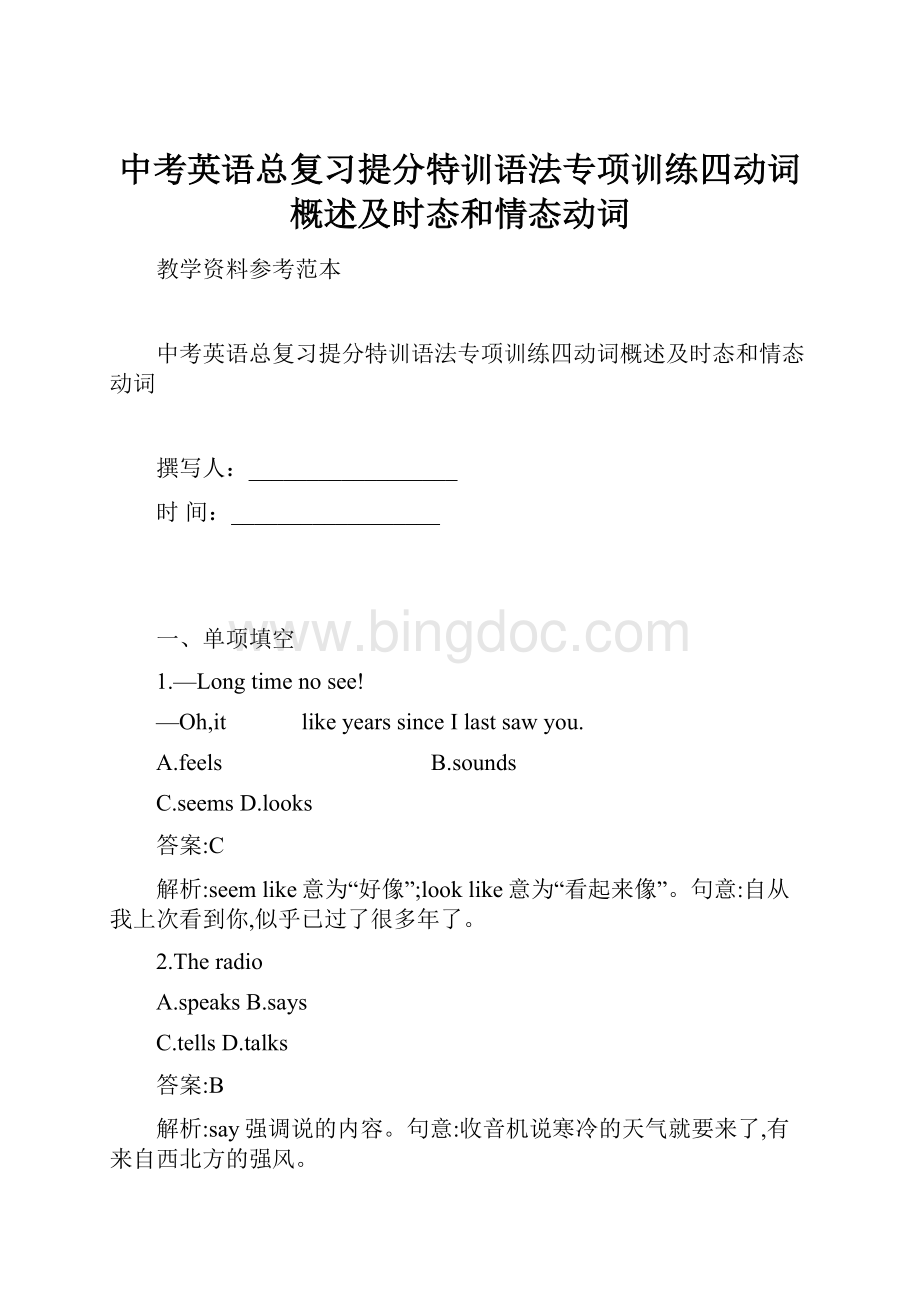中考英语总复习提分特训语法专项训练四动词概述及时态和情态动词Word下载.docx
《中考英语总复习提分特训语法专项训练四动词概述及时态和情态动词Word下载.docx》由会员分享,可在线阅读,更多相关《中考英语总复习提分特训语法专项训练四动词概述及时态和情态动词Word下载.docx(20页珍藏版)》请在冰点文库上搜索。

C.putoffD.putaway
D
他收起餐具和他的朋友一起出去了。
puton“穿上”;
putup“搭起”;
putoff“推迟”;
putaway“把……收起来”。
故选D项。
5.—I’msorryI myexercisebookathomethismorning.
—Itdoesn’tmatter.Don’tforget itherethisafternoon.
A.left;
totakeB.forgot;
bringing
C.left;
tobringD.forgot;
tobring
“leavesth.+地点”表示“把某物落在某地”;
forgettodosth.“忘记去做某事”。
bring“把……带过来”;
take“把……带走”。
故选C项。
6.—Thetomatoandeggsoup nice.Didyoumakeitbyyourself?
—Yes.Wouldyoulikeanotherbowl?
A.tastesB.smells
C.soundsD.feels
A
taste“尝起来”。
西红柿鸡蛋汤尝起来很美味。
是你自己做的吗?
7.FollowmeandI’ll youthewaytothewashroom.
A.fallB.pick
C.showD.invite
show“展示”。
跟着我,我给你说去洗手间的路。
8.—Smartphonesaremoreandmorepopularnow.
—Sotheyare.Buttheystill toomuch.
A.payB.cost
C.takeD.spend
they在此指代物smartphones,因此用cost。
9.Ifyoudon’tknowhowto stress,youcanaskyourparentsandteachersforhelp.
A.arguewithB.agreewith
C.dealwithD.partwith
arguewith“与……争吵”;
agreewith“同意”;
dealwith“处理”;
partwith“分离”。
由句意“如果你不知道如何处理压力,你可以向父母和老师寻求帮助”可知选C项。
10.Hedecidesto thedifficultproblembyhimself.
A.tryoutB.checkout
C.workoutD.handout
tryout“试验”;
checkout“检查”;
workout“解决”;
handout“分发”。
由句意“他决定独自解这道难题”可知选C项。
11.Thebookwon’t untiltheendoftheyear.
12.Theradioistooloud.Please .
A.turnitdownB.turnitup
C.turnitonD.turnitover
由上一句“收音机太响了”可知下一句应该是“请调低音量”。
turndown“调低”。
13.—Howmuchisyourcoat?
—Oh,it me100yuan.
A.costB.spent
C.paidD.took
it代指上文提到的物“yourcoat”。
故选A项。
14.Thebirthdaycakewas intoseveralpiecesandthechildrenbegantoeat.
A.fallenB.driven
C.dividedD.knocked
divide...into...意为“把……分成……”。
由句意“生日蛋糕被分成几块,孩子们开始高兴地吃起来”可知选C项。
15.—Isyourfatherinnow?
—No,he toPanChangjiangMemorialwithhisfriends.
A.hasbeenB.hasgone
C.willgoD.went
由答语“不”可知其出去了还没有回来。
故用hasgoneto。
16.Myunclewillcallmeupwhenhe inJinan.
A.arrivesB.willarrive
C.isarrivingD.hasarrived
由when引导的时间状语从句,如果主句是一般将来时,从句用一般现在时表示将来。
17.Theboy hisrightlegwhenhewasridingtoschool.
A.hurtsB.hurt
C.ishurtingD.hashurt
由时间状语从句whenhewasridingtoschool可知,“腿受伤”这一动作发生在过去,因此用一般过去时。
18.—Excuseme,canI yourpen?
—Sorry,Ihave ittoBob.
A.borrow;
lentB.borrow;
borrowed
C.lend;
borrowedD.lend;
lent
——请问,我可以借你的钢笔吗?
——对不起,我把它借给鲍勃了。
borrow“借入”;
lend“借出”。
19.Tom thepianoeverydaywhenhewasinprimaryschool.
A.playsB.played
C.wasplayingD.hasplayed
由时间状语可知时态为过去时,再由everyday可知时态为一般过去时。
20.Alicelikesdoinghousework.She herroomeveryafternoon.
A.cleansB.cleaned
C.iscleaningD.hascleaned
由everyafternoon可知时态为一般现在时。
21.Maria thedishesinthekitchenatthistimeyesterday.
A.doesB.did
C.isdoingD.wasdoing
由atthistimeyesterday(昨天这个时候)可知,本句用过去进行时。
昨天这个时间玛丽亚正在厨房做菜。
22.—Areyousurprisedattheendingofthemovie?
—No,becauseI thestory.
A.readB.willread
C.havereadD.wasreading
由答语No可知其已经读过这个故事,因此用现在完成时。
23.StudentsinClassOne themuseumnextFriday.
A.visitedB.visit
C.willvisitD.havevisited
由nextFriday可知时态为一般将来时。
24.Theboysshoutedexcitedlywhenthey tothetopofthemountain.
A.climbedB.areclimbing
C.climbD.climbs
由shouted可知,“登山”这一动作发生在过去,用一般过去时。
当孩子们爬到山顶时,他们兴奋地呼喊。
25.Look!
Thechildren treesonthehill.
A.plantedB.plant
C.haveplantedD.areplanting
由句首的look可知,本句用现在进行时。
26.Bythetimemyparentsreachedhomeyesterday,I thedinneralready.
A.hadcookedB.cooked
C.havecookedD.wascooking
由句首的bythetime可知,做饭发生在“到家”之前,即发生在过去的过去,用过去完成时。
27.I myhometownforalongtime.Ireallymissit.
A.leftB.wentawayfrom
C.haveleftD.havebeenawayfrom
由时间状语foralongtime可知时态为现在完成时且谓语动词为延续性动词。
28.—Whatwereyoudoingwhenwewereplayingbasketballyesterdayafternoon?
—I theclassroom.
A.wascleaningB.havecleaned
C.willcleanD.clean
由问句可知时态为过去进行时。
29.There agreatconcertinthetheaternextSaturdayevening.
A.willbeB.willhave
C.hasD.isgoingtohave
由时间状语nextSaturdayevening可知时态为一般将来时,therebe结构的将来时用therewillbe。
30.—Ihearyourgrandpahasanoldcupinyourhome.
—Yes.It drinkingtealongagoandmygrandpa drinkteawithitwhenhewasyoung.
A.wasusedto;
wasusedto
B.usedfor;
usedto
C.wasusedfor;
D.wasusedfor;
beusedfordoingsth.“用于做某事”;
usedtodosth.“过去常常做某事”。
二、用括号内所给词的适当形式填空
1.—Bobwantstoknowifyou (go)forapicnictomorrow.
—Yes.Butwewillstayathomeifit (rain).
willgo;
rains
2.Lilyoften (go)toschoolatseveninthemorning.
goes
3.TheBlacks (fly)toNewYorkyesterday.
flew
4.Thegovernmentsaidthey (spend)alargeamountofmoneyonpollutionthenextyear.
wouldspend
5.—Youseemtoknowmuchaboutthecity.
—That’strue.I (visit)ittwice.
havevisited
6.OurEnglishteacher (phone)meyesterday.
phoned
7 (bring)ussomeflowers.
brings
8.Threemonths (pass)sinceIlastsawhim.
haspassed
9.Doyouknowthemanwhois (lie)onthehospitalbed?
lying
10.Theteacheralways (read)afunnystoryattheendoftheclass.
reads
11.Mr.Black (buy)twopairsofshoesforhissoninthemallyesterday.
bought
12.Acarsuddenly (appear)aroundthecornerinthesmallvillage.
appeared
13.Jim’smother (point)athisshoesandaskedhimtocleanthem.
pointed
14.Weare (plan)avacationtoTibetthissummer.
planning
15.LiMing (finish)hishomeworkontime.Heneverputsitofftilltomorrow.
finishes
16.Thewaterispollutedsoseriouslythatwecan’t (drink)it.
drink
17.Thebread (taste)verynice.Wouldyouliketohavesome?
tastes
18.—WhereisLiMing?
—He (go)tothegym.Hewillbebackinfiveminutes.
hasgone
19.I (lend)thatrecordtoJohnbutnevergotitback.
lent
20.Unlessit (rain),we’llvisitShanghaiWildAnimalParkthisweekend.
21.Ifeelconfidentthatourschoolfootballteamwill (win)thematch.
win
22.Helen’sknowledgeofspace (increase)inthepastfewyears.
hasincreased
23.Shewentintotheroomand (shut)thedoor.
shut
24.Theboyrealizedhe (behave)badlyanddecidedtosaysorrytothatlady.
hadbehaved
25.MissLioften (encourage)ustotakepartinphysicalactivitiesafterclass.
encourages
情态动词
1.—MustIcleanthehousenow,Mr.Smith?
—No,you .
A.can’t B.shouldn’t C.wouldn’t D.needn’t
must引导一般疑问句的否定回答用needn’t。
2.Thelastbushasleft.I’mafraidyou walktoschool.
A.canB.havetoC.mustD.may
must表示主观的要求;
haveto表示客观的需要。
由上文句意“末班车离开了”可推测下文句意为“恐怕你必须步行到学校”。
3.—Excuseme,couldIborrowyourbike?
—Ofcourseyou .
A.couldB.canC.mustD.need
由上文句意“打扰了,我能借你的自行车吗?
”可推测下文答语“当然可以”。
4.—CanIgotothepark,Mum?
—Certainly.Butyou bebackbysixo’clock.
A.canB.mayC.mightD.must
由but可知可以去公园,但“必须”在6点以前回来。
5.People
A.mustB.canC.needD.may
must“必须”,表示命令。
6.—MayItakethismagazineoutofthereadingroom?
—No,you .
A.mightn’tB.won’t
C.needn’tD.mustn’t
may引导的表示请求的疑问句做否定回答时可用mustn’t“禁止”。
7.—Who’ssinginginthegarden?
—It beMr.Brown.Healwayspracticessingingatthistime.
A.mustB.can’tC.needD.may
must“一定”,表示有把握的肯定推测。
8.You worryaboutyourson.Hewillgetwellsoon.
A.needn’tB.can’t
C.mustn’tD.shouldn’t
由下文句意“他不久就会变好的”可推测上文句意“你不必担心你的儿子”。
needn’t“没必要”。
9.We usemobilephoneswhentheplanetakesoff.
A.maynotB.shouldn’t
C.needn’tD.mustn’t
当飞机起飞时我们不准用手机。
mustn’t“不准”表示禁止。
10.We fightagainstpollution.
A.mayB.should
C.mustn’tD.needn’t
由句意“我们应该和污染做斗争”可知,B项符合语境。
should“应该”。
11.—Lingling,canIuseyoure-dictionary?
—Sure.Butyou returnitafterclass.
A.mustB.canC.mayD.would
答句句意:
当然可以,但你必须下课后还我。
must“必须”。
12.—
—I’dloveto,butIhavetostudyformymathtest.
A.ShouldB.MayC.MustD.Can
“Canyou...?
”句型中,can表示请求。
13.—Fiftydollarsforsuchablouse!
You bejoking.
—I’mserious.It’smadeofsilk.
A.mustB.canC.mayD.need
由上句“这样的一件女衬衫要50美元”可知觉得“一定”是在开玩笑,must“肯定;
一定”。
14.—Bob,whereisLinda?
—She beinthelibrary,butIamnotsure.
A.mustB.mayC.needD.hasto
由“但是我拿不准”可知用may表示把握性较小的推测。
15.—Ican’tfindDad.Whereishe?
—I’mnotsure.He beinthestudy.
A.mustB.mayC.needD.will
由上文句意“我不能确定”可推测,他可能在书房。
16
—Oh,no.We crossthestreetuntilthetrafficlightturnsgreen.
A.mustn’tB.needn’t
C.shouldD.maynot
mustn’t“不准”用来表示禁止做某事。
17 affordschoollunches,sothegovernmentistryingtohelpthem.
A.needn’tB.shouldn’t
C.can’tD.mustn’t
由上句“许多学生来自贫困家庭”可推知他们“不能”负担得起学校午餐。
18.—Hi,Mike.IsawJiminthezoojustnow.
—It behim.HehasgonetoBeijing.
A.c